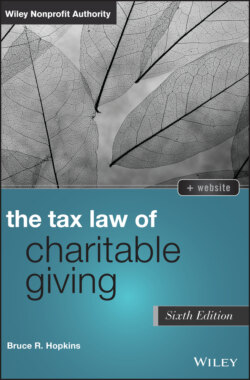Читать книгу The Tax Law of Charitable Giving - Bruce Hopkins R., Bruce R. Hopkins, David Middlebrook - Страница 64
§ 3.2 CONTRIBUTIONS OF PROPERTY IN GENERAL
ОглавлениеThe law of charitable giving becomes more complex in the case of a donor who makes a contribution of property, rather than a contribution of money.
At the outset, a determination must be made as to the value of the property.5 This value is known as the fair market value of the property. The process of valuing property for these purposes is discussed elsewhere.6
In many instances, the federal income tax charitable contribution deduction for contributions of property is based on the fair market value of that property. There are instances, however, when that value must be reduced for purposes of computing the charitable deduction. Generally, when this reduction in the deduction is required, the amount that is deductible is the amount equal to the donor's basis in the property. The deduction reduction rules are discussed elsewhere.7
Because the deduction for a gift of property is often based on the fair market value of the property, a donor can benefit when the property has increased in value since the date on which the donor acquired the property. The property is said to have appreciated in value; property in this circumstance is known as appreciated property. When certain requirements are satisfied, a donor is entitled to a charitable deduction based on the full fair market value of the property.8
This rule—allowance of the charitable deduction based on the full value of an item of property—is one of the rules in the tax law that is most beneficial to donors. It is particularly so when one considers that the donor in this circumstance is not required to recognize any gain on the transfer.9 The gain is the amount that would have been recognized had the donor sold the property; it is sometimes referred to as the appreciation element.
The donor's ability to have a charitable deduction based on the fair market value of the property and not recognize gain on the appreciation element in the property is viewed by some as an unwarranted benefit to donors and a violation of tax policy. Indeed, in some instances, recognition of gain is required.10
Likewise, a loss is not recognized when an item of property is contributed to a charity. In this circumstance, the donor should sell the property, experience the loss, and contribute the sales proceeds to charity. (By contrast, the donor of appreciated property is usually best advised to contribute the property to a charitable organization, rather than sell the property and donate the after-tax proceeds to the charity.)
The donor's ability to take a charitable deduction for a contribution of property, based on the fair market value of the property, depends on several factors. Chief among these factors are the nature of the property contributed, the tax classification of the charitable donee, and the use to which the charitable donee puts the property.
As to the first of these factors, the federal tax law categorizes items of property as long-term capital gain property, short-term capital gain property, and ordinary income property.
As to the second of these factors, the federal tax law classifies entities as to which deductible charitable contributions can be made as public charitable organizations, private foundations, governmental bodies, and certain other types of tax-exempt organizations (such as veterans' organizations).11
As to the third of these factors, the federal tax law divides the use to which a charitable organization puts donated property as a use that is related to the donee organization's tax-exempt purpose (related use) and a use that is not related to the donee organization's tax-exempt purpose (unrelated use).12
The extent to which a contribution of property is deductible for federal income tax purposes is dependent upon the interplay of these factors, plus the value of the property,13 the percentage limitations,14 and compliance with the substantiation and appraisal rules.15
